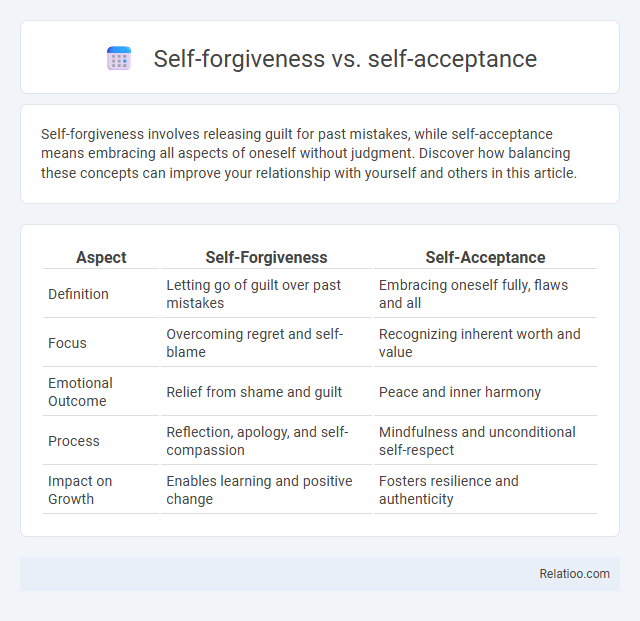Self-forgiveness involves releasing guilt for past mistakes, while self-acceptance means embracing all aspects of oneself without judgment. Discover how balancing these concepts can improve your relationship with yourself and others in this article.
Table of Comparison
| Aspect | Self-Forgiveness | Self-Acceptance |
|---|---|---|
| Definition | Letting go of guilt over past mistakes | Embracing oneself fully, flaws and all |
| Focus | Overcoming regret and self-blame | Recognizing inherent worth and value |
| Emotional Outcome | Relief from shame and guilt | Peace and inner harmony |
| Process | Reflection, apology, and self-compassion | Mindfulness and unconditional self-respect |
| Impact on Growth | Enables learning and positive change | Fosters resilience and authenticity |
Understanding Self-Forgiveness: Definition and Importance
Self-forgiveness involves recognizing your mistakes, taking responsibility, and letting go of guilt to promote emotional healing. Understanding self-forgiveness is crucial because it reduces negative self-judgment and fosters psychological well-being, unlike self-acceptance, which emphasizes embracing all aspects of yourself without necessarily addressing past wrongs. You benefit by cultivating self-forgiveness to break cycles of shame and move toward personal growth.
What is Self-Acceptance? Key Concepts Explained
Self-acceptance is the conscious and unconditional recognition of all aspects of oneself, including strengths, weaknesses, and flaws, without self-judgment or denial. Key concepts of self-acceptance involve embracing personal imperfections, maintaining a realistic self-view, and fostering inner peace by reducing self-criticism. Unlike self-forgiveness, which focuses on releasing guilt for past mistakes, self-acceptance creates a foundation for ongoing personal growth and emotional resilience.
The Core Differences Between Self-Forgiveness and Self-Acceptance
Self-forgiveness involves acknowledging your mistakes and releasing feelings of guilt and self-blame, enabling emotional healing and personal growth. Self-acceptance centers on embracing your strengths and weaknesses without judgment, fostering a stable and compassionate self-view. Understanding these core differences helps you cultivate a balanced mindset that promotes both accountability and unconditional self-love.
Psychological Benefits of Self-Forgiveness
Self-forgiveness significantly reduces feelings of guilt and shame, promoting emotional healing and psychological resilience. Unlike self-acceptance, which involves embracing one's flaws without judgment, self-forgiveness specifically addresses past mistakes and fosters personal growth by releasing self-condemnation. This process enhances mental well-being by restoring self-esteem, lowering anxiety, and improving overall life satisfaction.
Emotional Impacts of Practicing Self-Acceptance
Practicing self-acceptance profoundly reduces emotional distress by fostering a compassionate internal dialogue and diminishing feelings of shame and self-criticism. Unlike self-forgiveness, which specifically addresses remorse and guilt from past actions, self-acceptance cultivates overall emotional resilience and stability by embracing both strengths and weaknesses without judgment. This holistic emotional balance supports mental health, decreases anxiety, and enhances psychological well-being.
Common Barriers to Achieving Self-Forgiveness
Common barriers to achieving self-forgiveness include pervasive guilt, unrealistic perfectionism, and deeply ingrained negative self-beliefs that hinder emotional healing. Your ability to practice self-acceptance often conflicts with these obstacles, as it requires acknowledging your flaws without harsh judgment. Understanding the differences between self-forgiveness, self-acceptance, and self-compassion enables a clearer path to emotional resilience and personal growth.
Overcoming Obstacles to Self-Acceptance
Overcoming obstacles to self-acceptance involves recognizing the distinctions between self-forgiveness and self-compassion, where self-forgiveness addresses past mistakes by releasing guilt, while self-acceptance fosters embracing one's entire being without judgment. Psychological barriers such as perfectionism, negative self-talk, and internalized criticism hinder self-acceptance by perpetuating unrealistic standards and emotional resistance. Strategies including mindfulness practices, cognitive behavioral techniques, and self-compassion exercises prove effective in reframing self-perception and cultivating a resilient, unconditional acceptance of oneself.
Techniques for Cultivating Self-Forgiveness
Techniques for cultivating self-forgiveness include mindfulness meditation, journaling to express emotions, and cognitive reframing to challenge negative self-beliefs. Practicing self-compassion exercises helps you recognize your humanity and reduces harsh self-judgment. Engaging in therapy or support groups can provide structured guidance to foster genuine self-forgiveness and promote emotional healing.
Strategies to Enhance Self-Acceptance
Strategies to enhance self-acceptance include practicing mindfulness to observe thoughts without judgment and engaging in positive self-talk to counteract negative beliefs. Setting realistic goals and embracing imperfections fosters a growth mindset essential for long-term self-acceptance. Therapeutic approaches like cognitive-behavioral therapy (CBT) can also aid individuals in reframing self-critical thoughts and building emotional resilience.
Integrating Self-Forgiveness and Self-Acceptance for Personal Growth
Integrating self-forgiveness and self-acceptance enhances your personal growth by fostering emotional healing and resilience. Self-forgiveness allows you to release guilt and shame, while self-acceptance encourages embracing flaws and imperfections without judgment. Combining these practices creates a balanced mindset that promotes inner peace and empowers transformative change.

Infographic: Self-forgiveness vs Self-acceptance
 relatioo.com
relatioo.com